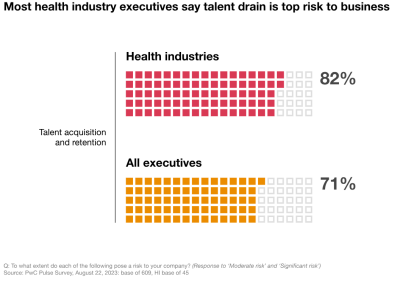Talent acquisition and retention continues to be a primary concern among healthcare executives, with 82% calling that the biggest risk to business, according to a new PwC survey.

“To become better positioned to attract and retain talent, healthcare execs are starting to rethink their traditional workforce and business models and invest in technology and innovation,” according to PwC’s August 2023 Pulse Survey: Focused on reinvention. “Some are even investing in their own schools for clinical staff training and development.”
Another finding the survey that should concern healthcare executives states that states only 35% of consumers highly trust their healthcare plan in 2023, down slightly from the 37% of consumers who said the same thing in 2022.
There’s an ever-widening gap between how much executives believe that consumers trust them and how much consumer trust actually exists, according to the Pulse Survey Report. While 35% of consumers highly trust their health plans, 92% of executives believe that to be the case.
“With so many Americans sounding skeptical, executives who believe customer trust is an important part of their firewall during a crisis may find that trust is brittle,” the report said. “And if trust crumbles, it could make it that much more difficult to address, or recover from, a crisis.”
Ceci Connolly, president and CEO of the Alliance of Community Health Plans (ACHP), whose 26 not-for-profit member organizations include both provider and health insurers spread over 40 states, pointed out to Fierce Healthcare that having individuals “highly trust” an organization—any organization—doesn’t come easy these days. Although Connolly says ]the healthcare sector must “absolutely do much better” in this area, she noted that global surveys around the world show a diminishment of trust in most businesses and other organizations.

However, the trust factor looms especially large in healthcare. “It often is life and death,” said Connolly. “I don’t mean to sound hyperbolic, but when you combine those two things, it’s why we and our members really put this at the top of their priorities.”
This is where the “community” part in the ACHP works to the organization’s benefit, she said. The large commercial for-profit health plans are headquartered “who knows where,” Connolly said. Individuals working at ACHP’s member organizations see patients and providers in the grocery store, at a church service, picking up children from school—at many community functions.
Trust factors into retention of Medicare Advantage beneficiaries, for example, she said.
“Eleven of our members had 90% retention of their Medicare Advantage beneficiaries,” Connolly said. “And if we just went to 80%, we’re above that retention data. Now, that’s not exactly the same as a trust survey. But pretty much when you're keeping 80% to 90% of your members year over year—and that’s far above industry averages—then you’ve got some credibility there with those folks, for sure.”
For the Pulse Survey, PwC interviewed 45 healthcare executives, a mix of individuals in health services and pharmaceutical industries. Healthcare executives need to focus on building robust talent pipelines by tailoring benefits for individuals with specific gifts, according to the survey. They should also redefine what constitutes a healthcare team. In addition, they should embrace automation to improve productivity.
Better patient care automation can, for example, enable nurses to spend more time with patients and less time on administrative or lower priority tasks, the PwC study said. “New artificial intelligence and digital approaches to delivering care such as telemedicine can require fewer on-site resources. Tech-led collaborations can serve as sources of innovation, enabling better clinician staffing as well as diagnosing and treating patients using at-home blood tests, telepathology, medical imaging, data repositories and other methods.”
Regarding getting individuals to trust health plans more, there’s no secret formula, Connolly said. “It’s not like we can put 10 bullet points down on a single piece of paper and say: ‘Here. Do these 10 things and trust will go up.’ We know that it’s very nuanced. It varies by city and town and rural and age demographics. And every other demographic element has to be factored in. It has to be sophisticated. It has to be smart. It has to be genuine.”